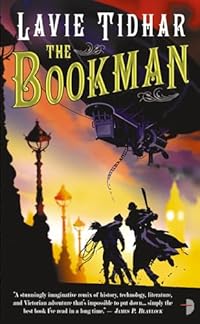The Bookman by Lavie Tidhar
Posted in Reading Reviewed, Science Fiction, Altered History at 12:00 on 9 January 2016
In “The Bookman Histories”, Angry Robot, 2012, 303 p. Originally published in 2010.


This is the first of Tidhar’s “Bookman” trilogy (original book cover left) and constitutes steampunk at its flashiest. Amerigo Vespucci’s trip to the New World – here known as Vespuccia – has aroused a set of marooned extraterrestrial lizards, Les Lézards, who have since taken over the throne of Great Britain but been thrown out of France.
Our hero is Orphan (he knows no other name) and the plot is kicked off with a pair of exploding books, one of which kills Orphan’s girl-friend, Lucy, to whom he was newly engaged. He is drawn into a web of intrigue laid by the enigmatic Bookman by the implication that she is not dead – or at least he can be reunited with a version of her. The action ranges from a Victorian London to the Caribbean – where Caliban’s island of Les Lézards is located (and where he discovers his true lineage) – back again to London and finally to Oxford.
Now, one of the joys of altered history is the chance to encounter well-known names – real or otherwise – in unfamiliar settings but, really, Tidhar throws the kitchen sink at it. Apart from frequent sly allusions, we meet not only newspaper reports from Rudyard Kipling but Persons from Porlock; and Henry Irving, Beerbohm Tree, Mrs Beeton, Jules Verne – plus his ship (and submarine Nautilus, what else?) Not to mention, among others, body snatchers, the Mechanical Turk, Karl Marx, Sherlock Holmes, Mycroft and Moriarty – who is Prime Minister no less. We also encounter various simulacra, pirates (with keel-hauling, plank-walking and all) that mysterious island, an interplanetary probe (which is actually potentially more sinister) and a vast hidden library. Breathless isn’t the word.
Had I not already read the second book in the series, the much better Camera Obscura, I would perhaps not have bothered doing so on this evidence. But I have the third in this volume, The Great Game, still to go, so I will get round to it.
Pedant’s corner:- In Tidhar’s introduction to the three collected books “it was the obvious end for the arc began by Orphan’s choice” (begun.)
Otherwise:- to go see her (to go to see her – or just “to see her”,) “no sooner had Maskelyne departed that the door chimed again” (than the door chimed,) overlaying the grief (overlying,) “his face were strangely peaceful” (was,) indistin-guishable not at a line break, “bound with Les Lézard” (Les Lézards,) whiskey (whisky,) “he left his drink on the table besides Jack’s glass” (beside,) automatons (automata,) “at the bottom off…” (of, surely?) Gibbons’ (Gibbons’s,) go see it (go to see it,) flamingos (flamingoes?) “from his momentary surprised” (surprise,) “us humans need to stick together” (“us need to”? That would be we humans,) outside of (outside; no “of” necessary, though “outside” appeared two more times in that same five line paragraph,) sail-ships (sailing ships,) the Nautilus’ deck (Nautilus’s, a page later Moses’s was fine but one more page on we had Aramis’,) “like the unmixed paint on an artist’s palate” (did the artist mix the paint by mouth, then? Palette that would be,) “not sure what he had let himself into” (not sure what he had got himself into; or, not sure what he had let himself in for,) the King of England (yes, but also the Empire,) the fungi (it was singular; so fungus,) “he felt exulted” (exultant, I think,) “you knew were you were with them” (where you were,) “Orphan was glad for that” (glad of that,) a group of men… were standing (a group was standing.)
Tags: Altered History, Alternate History, Alternative History, Camera Obscura, Lavie Tidhar, Science Fiction, steampunk
